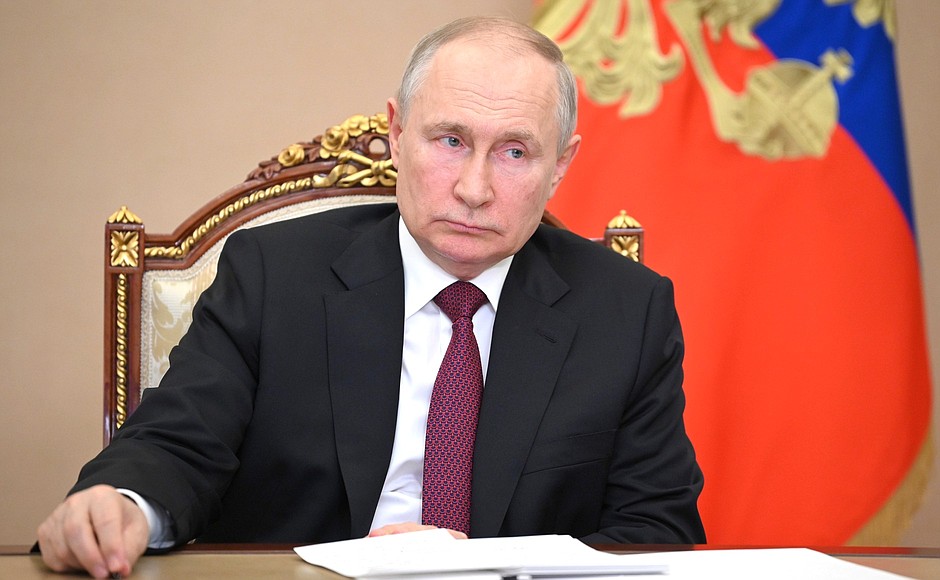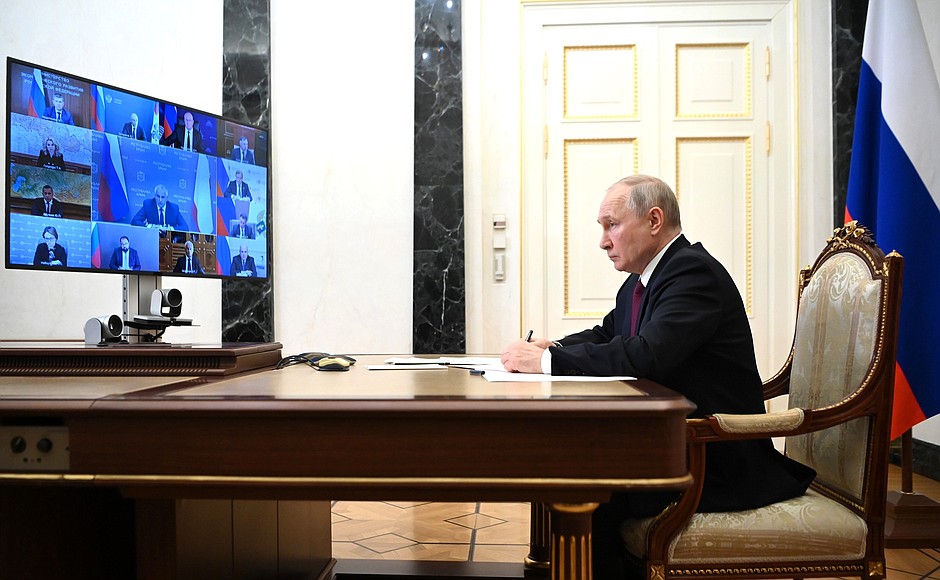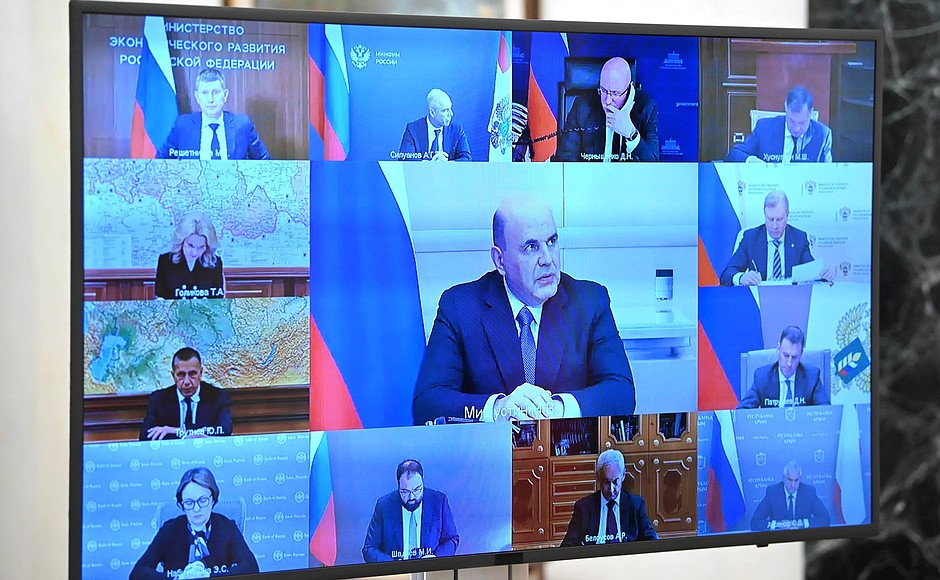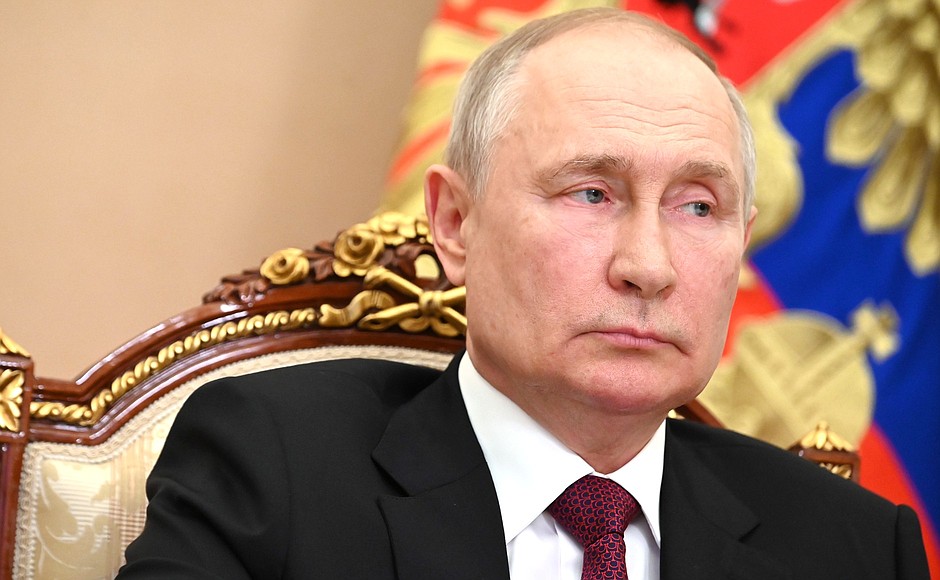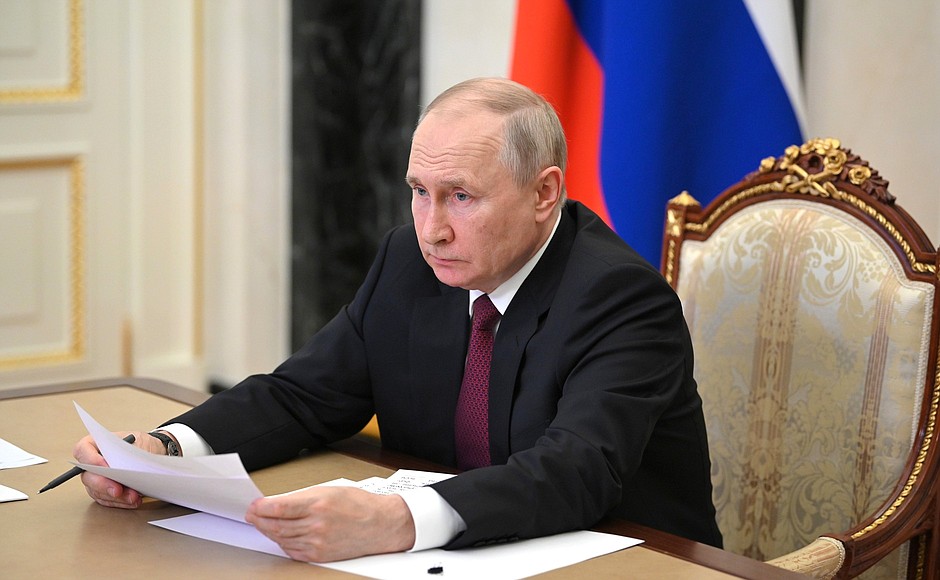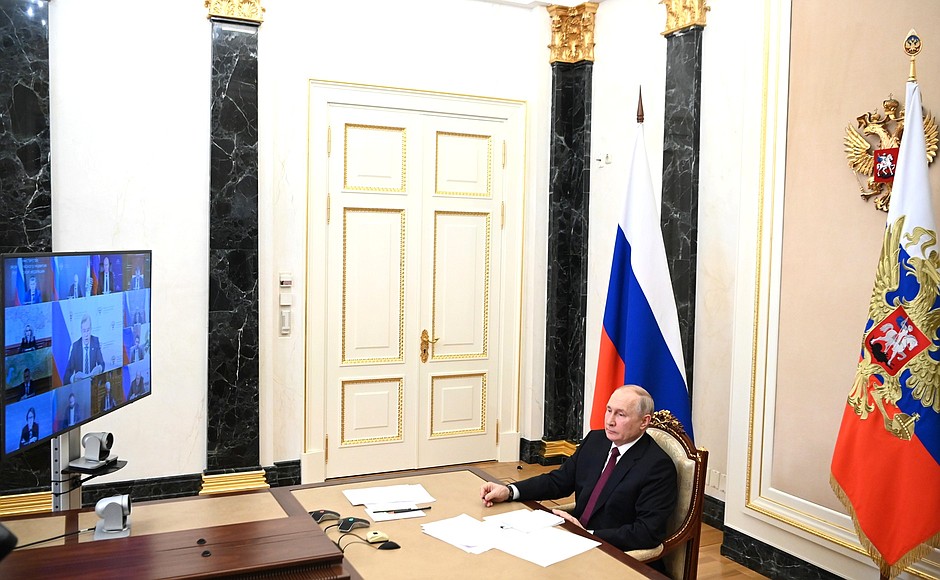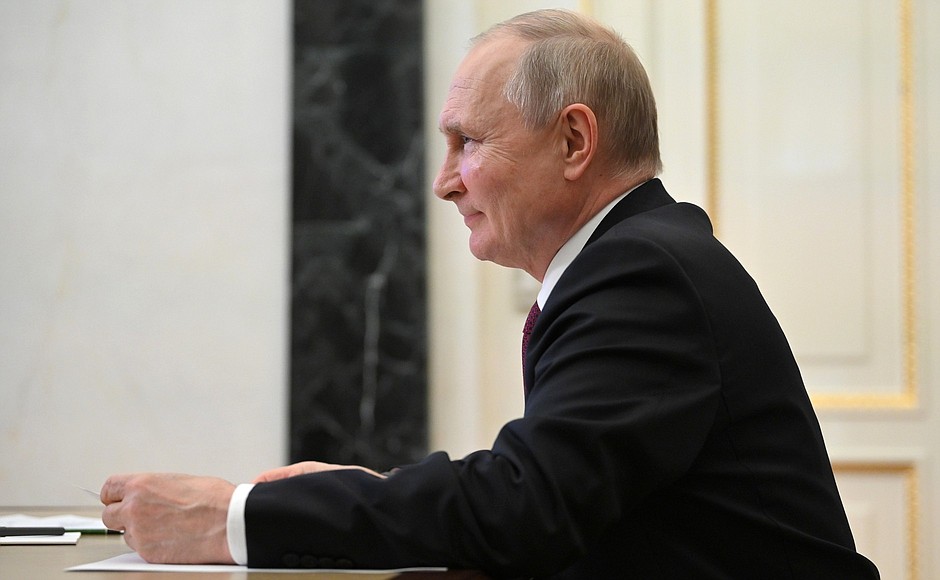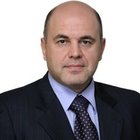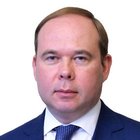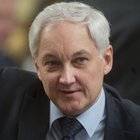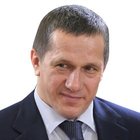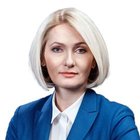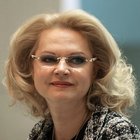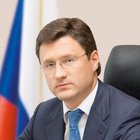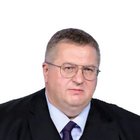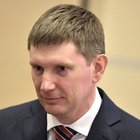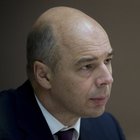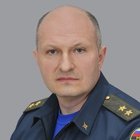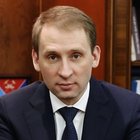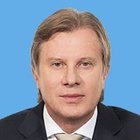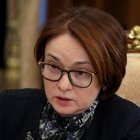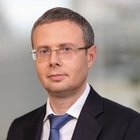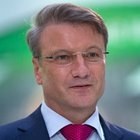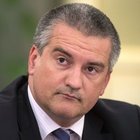The meeting was attended by Prime Minister Mikhail Mishustin, Chief of Staff of the Presidential Executive Office Anton Vaino, First Deputy Prime Minister Andrei Belousov, First Deputy Chief of Staff of the Presidential Executive Office Sergei Kiriyenko, Deputy Prime Minister – Chief of the Government Staff Dmitry Grigorenko, Deputy Prime Minister – Minister of Industry and Trade Denis Manturov, Deputy Prime Minister – Presidential Plenipotentiary Envoy to the Far Eastern Federal District Yury Trutnev, deputy prime ministers Viktoria Abramchenko, Tatyana Golikova, Alexander Novak, Alexei Overchuk, Marat Khusnullin and Dmitry Chernyshenko, Presidential Aide Maxim Oreshkin, Minister of Economic Development Maxim Reshetnikov and Minister of Finance Anton Siluanov. Minister for Civil Defence, Emergencies and Natural Disaster Relief Alexander Kurenkov, Minister of Natural Resources and Environment Alexander Kozlov, Minister of Transport Vitaly Savelyev, Minister of Digital Development, Communications and Mass Media Maksut Shadayev, Governor of the Central Bank Elvira Nabiullina, Head of the Federal Anti-Monopoly Service Maxim Shaskolsky, and CEO and Chairman of the Sberbank Management Board German Gref were also invited to attend the meeting.
* * *
Excerpts from transcript of videoconference meeting with Government members
President of Russia Vladimir Putin: Colleagues, good afternoon.
Today we have a very important matter to discuss: the introduction of artificial intelligence in economic sectors.
But, as usual, let us begin with current issues, the first one being addressed to Mr Aksyonov: what is the situation like at the training ground in the Kirov District of Crimea?
Governor of the Republic of Crimea Sergei Aksyonov: Mr President, colleagues,
With your permission, Mr President, I will begin my report.
At about four in the morning a fire broke out at the military training ground in the Kirov District of the Republic of Crimea. As a consequence, some of the ammunition stored at the site detonated due to the fire. I went to the site, and within an hour we created an emergency operations centre comprising representatives of federal, republican and municipal authorities. On the spot, together with my colleagues, first of all, with law enforcement officers, we fully assessed the situation.
After assessing the situation, I made an on-the-spot decision to evacuate the residents of four communities that live within a radius of five kilometres from the epicentre: about 2,200 people in total.
(Sergei Aksyonov reported on arranging temporary accommodation and alternative routes in close proximity to the training ground.)
Mr President, the situation is fully under control. No deaths, injuries or damage have been reported. I want to thank my colleagues from the federal centre and municipal bodies. Everybody performed their duties. All decisions were taken promptly. Thanks to these measures and your support, the situation will get back to normal within 24 hours.
Mr President, no involvement on your side is required. My colleagues and I have everything under control.
Vladimir Putin: All right, Mr Aksyonov. We still need to investigate the cause of the fire. As concerns helping people and ensuring their security, you must do everything it takes. I believe it will not take much time. The fire will go out eventually. But for now, it is important to be careful.
Thank you.
Sergei Aksyonov: We are fulfilling your instruction, Mr President.
Vladimir Putin: Thank you.
Mr Savelyev, tell us about the current state of affairs in air transportation.
Minister of Transport Vitaly Savelyev: Thank you.
Mr President, colleagues.
According to the approved comprehensive development programme for the aviation industry, Russian airlines are expected to carry 101.2 million passengers this year. It should be noted that this performance indicator was set on the condition that the 11 airports located in southern Russia, with passenger traffic of about 19 million per year, would operate.
Despite the fact that these 11 airports are still closed, I want to note that we have already carried one million passengers in excess of the number planned to date. The passenger traffic as of the end of the first half of the year totalled 47.5 million, which is almost 18 percent higher than during the same period last year when we carried just over 40 million.
I want to emphasise, Mr President, that, based on this workload, we will transport more than 100 million passengers this year and will meet the target even despite the closure of the 11 Russian airports. With these airports also in operation, we would be able to carry around 120 million, a figure comparable to 2019 when, in the absence of any restrictions, our airlines flew all over the world and transported 128 million people. We are close to this number.
The high demand for air travel and the current workload indicate that it is necessary to increase the fleet. Therefore, we are looking forward to obtaining more aircraft from our aircraft manufacturers, in accordance with orders placed by airlines. We will certainly benefit from the fleet expansion because the demand is very high.
I will report separately on international transportation. As of now, 17 Russian airlines make direct flights to 24 countries. We are also open to international traffic: 52 foreign airlines from 29 countries make flights to Russia. We are working systematically to restore international air traffic.
We resumed flights to Georgia on May 19 thanks to your decision, and we are gradually increasing the number of flights. To date, we make 33 flights per week.
On June 4, the IrAero airline opened Irkutsk-Hanoi flights to Vietnam, and it makes two flights per week now.
We have increased the number of flights to Cuba. In 2022, only one Russian company, Nordwind, made charter flights to Cuba. On July 1, 2023, Rossiya Airlines started flying to the island, and it makes regular flights from Moscow to Varadero twice a week now to meet the increased passenger demand.
Thanks to the growth of international traffic, this year we plan to transport about 20 million passengers on international flights. This means that the number of passengers on international flights will increase by 12 percent year on year.
Domestic air services remain a priority for us in terms of the number of passengers and the development of domestic tourism. Russian airlines have greatly increased their destination networks in the 2023 summer season. <…>
We can meet the current transportation demands thanks to a modern aircraft fleet. We still have 1,166 passenger airliners, including 94 long-distance ones.
This is enough to cater for domestic and international travel requirements. Our airlines have the necessary stocks of spare parts and consumable and expendable materials despite the more complicated supply logistics.
Maintenance and repair services are provided in Russia by three large, accredited organisations, which have the required number of personnel and the necessary equipment. The standards of flight safety requirements remain invariably high. We are closely monitoring the safety standards of our aircraft pool.
The development of domestic travel is unthinkable without the necessary infrastructure. As of now, we are implementing 43 projects within the framework of measures to develop airport infrastructure; 18 of them are scheduled to be completed this year, including 10 runways and eight auxiliary infrastructure facilities.
Transport infrastructure is a key driver of the regions’ economic growth. Taking into account the vast territory of our country and the large distances between centres of attraction in the regions, the development of airport infrastructure is one of our priorities.
(The minister also reported on the 2023 subsidies to the industry, rising transport prices, and increasing demand for air transportation. Vitaly Savelyev cited the example of the national carrier, Aeroflot. In the first five months of 2023, the airlines has transported 16 million passengers or 23 percent more than in the same period last year. The passenger load factor in the period under review reached a record high figure of 88 percent.)
In conclusion, I would like to say that Russia is increasing transportation on domestic and international flights despite the sanction restrictions. The availability of air transport and high service standards are the factors that make travelling with Russian airlines attractive to people.
Thank you. This concludes my report.
Vladimir Putin: Mr Savelyev, on which flights have ticket prices increased, domestic or international ones?
Vitaly Savelyev: They did on some flights. This depends on the demand.
Prices have always been higher on international flights because we have to pay in foreign currency for our planes to fly abroad, for example, to Turkiye or the United Arab Emirates.
Some routes in Russia enjoy increased demand, which explains the rise in ticket prices for these flights. Overall, we are above plan for international flights now and below plan for domestic flights, just like last year. One of the main reasons is that 11 of our southern airports are currently not operating.
Vladimir Putin: You have mentioned the reasons for the growth of tariffs and ticket prices, including logistics reasons and the delivery of the necessary spare parts.
Do you remember that I tried to convince you to buy more Russian-made planes when you were the chairman of Aeroflot? There were several heated debates between us then. You reasoned that our Western partners were reliable, that all was well and that they were good people. Today, our aircraft producers cannot increase their production capacities overnight. This will take time, even though there is a demand for their products now, and it is growing. It is one more factor linked to the increase in tariffs. Nevertheless, I very much hope that this problem will be resolved and that transportation requirements will be met through joint work with your colleagues in the industry, the Industry Ministry and sector-specific enterprises.
Ms Nabiullina, how are things with the third form of national currency? What are your plans in this department?
Central Bank Governor Elvira Nabiullina: Good afternoon,
I think we are talking about the digital ruble. I will now go over the completed phases of the project to create the digital ruble and then outline our further moves.
As you may recall, in 2021, we published the concept, discussed it with the market participants, stakeholder ministries and agencies, and experts. In late 2021, we created a digital ruble platform prototype. In 2022, we built the platform. This year, it became commercially available. In other words, we quickly, within two years, built an infrastructure of our own design. This platform relies on a hybrid architecture and combines the advantages provided by a centralised system with the distributed register technology, blockchain. Individuals and legal entities will be able to use this platform to open digital wallets to credit digital rubles.
The Bank of Russia is operating this platform meaning that the Bank of Russia is liable for operations with digital rubles and the safety of funds kept in digital wallets. Transactions and digital wallet balances will be protected by bank-client privilege in the same way regular bank accounts are.
Last year, we conducted test transactions with 13 banks. In August, we will launch pilot operations with actual digital rubles with the participation of the clients from this pilot group of banks.
The digital ruble is the third, additional form of national currency same as cash and non-cash money. All three forms will be equal meaning that one digital ruble will be equal to one cash ruble and one non-cash ruble. It complements the existing payment instruments that we use now. These funds will be used for payments and wire transfers, meaning that deposits or loans in digital rubles will not be available.
(Elvira Nabiullina went on to discuss new opportunities offered by the digital ruble. In particular, digital ruble-based transactions will be cost-free for individuals, and businesses will save money on accepting non-cash payments. The head of the Central Bank also spoke about the upcoming digital ruble testing with high-level requirements for information security in mind).
Many countries are creating their own national digital currencies. The digital ruble platform capability includes the option for cross-border interaction. Two scenarios are possible here. The first one includes interaction between our platform and the digital currency platform of another country. The second scenario includes the creation of a common clearance centre that can accommodate digital currency platforms from different countries. We are discussing both options with the countries that are willing to be part of this project.
After we make sure that everything is working properly, we will decide on additional steps to scale the digital ruble. According to our estimates, this could happen in 2025 or later. Clearly, it will take several years for the digital ruble to become part of our everyday life.
The launch of the digital ruble will make Russia one of the first countries with a national digital currency, a national payment card system, its own fast payment system, and its own alternative to SWIFT in the form of the Financial Messaging System. We will continue to introduce low-cost and convenient services for individuals, businesses and the state.
Vladimir Putin: Good. Great. Thank you very much.
Ms Golikova, you and I just took part in an event hosted by the Russia – Land of Opportunity platform, whose participants discussed tourism. In this connection, I have a question about electronic visas. How is this work going?
Deputy Prime Minister Tatyana Golikova: Good afternoon, Mr President, colleagues,
On your instruction, we started working on single electronic visas in 2019. The single electronic visa for entry into our country for 16 days for tourist, business, humanitarian and visitor purposes was supposed to be launched on January 1, 2021. The requisite regulatory framework has been put in place, and in October 2020 the Government approved a list of 52 countries and identified 92 state border entry points where the electronic visa would be valid. The Foreign Ministry has created a dedicated website and a dedicated mobile app available for downloading on this website for foreign citizens to submit visa applications.
However, the pandemic interfered with launching the e-visa system on January 1, 2021. On July 14, 2022, the coronavirus restrictions were lifted. However, today, the procedure approved by you, Mr President, remains in force, according to which a moratorium on issuance of e-visas was imposed on March 5, 2022 as part of visa-related measures in response to unfriendly moves by certain states.
In September 2022, during a meeting of the State Council Presidium, you issued instructions to submit proposals for the resumption of a single electronic visa for nationals of foreign states that are not on the list of unfriendly states.
Nevertheless, in conjunction with our colleagues from the federal executive authorities, primarily the Foreign Ministry, the Interior Ministry, and the Federal Security Service, we have done some extra work on this matter, and I have the following important message to convey: we believe it is inappropriate to deny issuance of electronic visas for short-term trips to Russia to the citizens of unfriendly countries as a response to unfriendly actions by the official authorities of those countries.
Maintaining simplified entry regulations for the citizens of these countries for tourism purposes, or for participation in scientific, sporting, and cultural events, or to maintain business contacts amid sanctions restrictions will primarily serve the interests of our State.
As for holders of diplomatic and service passports from unfriendly countries, they will not be able to obtain single electronic visas. As I earlier said, this procedure has been agreed upon by everyone.
In order to ensure security, the information to be provided by foreign citizens in order to obtain single electronic visas has been significantly expanded to ensure that undesirable individuals do not enter the territory of the Russian Federation.
Mindful of an additional discussion that was held in accordance with your instruction, we propose keeping unchanged the list of 52 countries that was drafted earlier, and adding three more countries – Vietnam, Cambodia and Myanmar – to it and launching electronic visas on August 1, 2023. All acceptance tests have been performed, and we are ready for this work.
Thank you and I would like you to support it.
Vladimir Putin: Good. Thank you for doing this ahead of schedule. I am sure people will find it helpful.
Now I would like to ask Mr Patrushev to speak on how field work is going, whether our agriculture sector has enough fuel and lubricants, whether credit schemes are working, and so on.
Please.
Minister of Agriculture Dmitry Patrushev: Thank you, Mr President.
Colleagues,
The sowing campaign in Russia has been completed. It went off without a hitch. We have carried out spring sowing on an area of 57 million hectares, of which more than 31 million hectares are under grain crops.
This structure of crop areas will make it possible to maintain a balance and provide the necessary volume of crop production for domestic consumption and also for world markets. I will add that 19 million hectares are under winter crops. This is higher than the long-term average.
We, of course, focus on monitoring the availability of all types of resources for our farmers. We are working on purchasing mineral fertilisers and agricultural machinery. Together with our colleagues from the Ministry of Industry and Trade, we control the availability of fuels and lubricants and plant protection products. Today, we can say that our farmers are fully provided with all types of resources.
Next is the financial coverage. All support tools are in demand for seasonal field work. They are in force and are preserved. Agricultural producers have access to subsidies for the purchase of fertilisers, fuels and lubricants, machinery, and plant protection products, among other things. As of today, about 102.5 billion rubles have been given to recipients in general, which is 67 percent of the stipulated limits.
The harvesting campaign has already entered an active phase and is being carried out in 35 regions of the Russian Federation. Cereals have been threshed from an area covering over 5.5 million hectares. More than 21 million tonnes of grain have been harvested. Almost 200,000 tonnes of potatoes and 242,000 tonnes of vegetables were harvested. I would also like to note here that the harvesting campaign is being actively carried out in new regions. About 700,000 tonnes of grain have been threshed there.
Thus, seasonal field work as a whole is being carried out basically as planned. If the weather is good, we expect a decent harvest for the main crops.
In particular, we expect at least 123 million tonnes of grain. And, as I said, this is optimal for maintaining balance in the domestic market and developing our foreign trade potential. I would like to emphasise that we see the potential for foreign trade with this harvest, about 55 million tonnes, so we will be able to feed our friendly partners.
Mr President, I would like to highlight one fact. As a result of non-fulfillment of Russia’s requirements under the grain deal, our transportation costs for exports have increased significantly. So exporters partly shift these costs to grain producers and our crop growers. We can say that the profitability of grain producers in Russia has almost halved over the year.
As a result, our grain producers made about 333 billion rubles in profit in 2021, and only 204 billion rubles in 2022. The lost income or losses in general, as it can be called, amounted to about 130 billion rubles. I would also like to draw your attention to this.
That concludes my report.
Vladimir Putin: Thank you.
Of course, Russia’s participation in the grain deal, meaning in solving issues related to exports of grain and cereals from the territory of Ukraine, directly concerns the interests of our farmers, as well as fertiliser producers.
In this sense, as you can see, we are talking about the so-called grain deal the Minister has just mentioned. The deal was made a year ago on July 22, 2022. Then this so-called deal was extended several times, the last time in May, through July 17. We extended this deal many times, and, in doing so, showed miraculous endurance, patience, and tolerance, hoping that our foreign colleagues would finally begin to fully comply with the agreed and approved parameters and conditions.
However, nothing like that happened, and no one was going to fulfill any obligations or agreements, but only constantly demanded something from Russia: to do one thing, then another, to provide this and that. Just outright arrogance and impudence, promises and empty chatter. All they did was compromise themselves with this; they undermined the authority, including the leadership of the UN Secretariat, which actually acted as a guarantor of the grain deal.
I must say that UN employees were sincerely trying to make good on all the promises of the West, but failed. They did almost nothing for the deal’s proper functioning, while our so-called Western partners put a lot of effort into torpedoing it. They did everything possible for this. Today they are literally lying to the whole world, saying matter-of-factly that Russia is supposedly to blame for the failure of this deal. Moreover, they blame Russia for almost all the disasters befalling the populations of African countries and several others, which the West once robbed and pushed into the abyss of wars, hunger and poverty, and now continues to plunder these states under its neo-colonial system. It profited shamelessly from the grain deal and completely distorted the meaning of these agreements and their essence. Let me remind you that initially the deal was aimed at ensuring global food security, reducing the threat of hunger and helping the poorest countries in Africa, Asia, and Latin America.
Actually, that is why Russia assumed certain obligations to facilitate its implementation, but this “deal” which the West was publicly presenting as them caring about the benefit to the poorest countries, was in fact used to enrich large American and European businesses that exported and resold grain from Ukraine.
Look, over the course of almost a year 32.8 million tonnes of grain were exported from Ukraine in total under this deal, 70 percent of which arrived in rich countries, above all countries of the European Union, while such countries as Ethiopia, Sudan, Somalia, Afghanistan, and Yemen – the poorest ones – received less than three percent of the total volume, or less than one million tonnes. At the same time, none of the deal’s conditions regarding the lifting of sanctions on Russian exports of grain and fertilisers to global markets have been fulfilled.
Moreover, obstacles are created even to our donations of mineral fertilisers to the poorest countries in need. Out of the 262,000 tonnes of fertilisers blocked in European ports, only two batches were sent: 20,000 tonnes to Malawi and 34,000 tonnes to Kenya. The rest remains in the Europeans’ unscrupulous hands, despite the fact that we are talking about a purely humanitarian action, to which no sanctions should apply in principle.
I will add one more thing. Some European countries that pay lip service to the necessity to give Ukraine the opportunity to export agricultural products, prohibit, and I want to emphasise this, the import of Ukrainian grain on their territory, citing the interests of their own producers.
Let me repeat that Russia, understanding the importance of global supplies of food and fertilisers, especially to the poorest countries, extended the deal several times, while Western countries used any pretext, or no pretext at all, to refuse to fulfill their obligations, including removing barriers to our agricultural exports. This resulted in direct losses of Russian farmers and enterprises producing fertilisers. Now the Minister said that, due to a 30–40 percent discount on our grain on the world markets, the losses of Russian farmers, if converted into US dollars, amounted to $1.2 billion.
In addition to this, the growing costs of seagoing freight to carry goods, costs of international financial settlements and other transactions have resulted in the halving of profitability for grain exports. Our fertiliser producers have also faced a similar problem: their losses are about $1.6 billion. For example, the cost of imported spare parts for their equipment and equipment in general increased by 40 percent, and costs for financial transactions grew by about 10 percent.
I will add a few more figures to make it clear. Ukraine produced about 55 million tonnes of grain last year, and its exports amounted to 47 million tonnes, including 17 million tonnes of wheat, while Russia harvested 156 million tonnes of grain last year and exported 60 million tonnes, of which 48 million tonnes were wheat. Russia’s share on the global wheat market is 20 percent, while that of Ukraine is less than five percent. These figures speak for themselves: it is Russia that makes a colossal contribution to global food security; and all claims that Ukrainian grain feeds the hungry around the world are speculation and lies. I would like to assure you that Russia is able to replace Ukrainian grain both on a commercial and free basis, especially since this year we again expect a record harvest, as the Minister reported.
Given all the factors I mentioned earlier today, it makes no sense to extend the grain deal the way it was. That is why we have objected to extending this so-called deal further. The deal expired on July 18.
I would like to emphasise that we are not against the deal per se, all the more so if we consider its importance for the global food market and for many countries of the world, and we will certainly consider the possibility of resuming our participation in it, only on the condition that all, without exception, principles of Russia’s involvement in this deal that had been earlier agreed are fully taken into account and, most importantly, are acted on.
I will remind you of the details.
First, there is lifting the sanctions on supplying Russian grain and fertilisers to world markets.
Second, all obstacles put in the way of Russian banks, financial institutions which service food and fertiliser supplies must be removed, including their immediate reconnection to SWIFT. We do not need promises or ideas regarding this; we want this condition to be met.
Third, supplies of spare parts for agricultural machinery and the fertiliser industry to Russia must be resumed.
Next, all issues relating to ship chartering and insurance of Russian food export deliveries must be resolved and food supply logistics must be ensured in full.
Next, conditions that do not hinder the growth of supplies of Russian fertilisers and the raw materials for their production must be created, such as resuming the operation of the Togliatti-Odessa ammonia pipeline, which was clearly blown up and destroyed on the Kiev regime’s order. Actually, this act of sabotage has received no response from the international community or from the UN.
Russian assets related to the agricultural sector must be released.
I will not list all the terms under which our country agreed to take part in this grain deal – they are specified, in particular, in the relevant Russia-UN Memorandum. You can read it to learn more about them. Most importantly, our Western colleagues must deliver on them.
The only thing I want to note again is that, initially, the essence and the meaning of the grain deal were of great humanitarian importance. The West has completely nullified and distorted this meaning. Instead of providing aid to the countries which really need it, the West has used the grain deal for political blackmail and, in addition, as I already said, has made it a tool that allowed transnational corporations of speculators in the global grain market to enrich themselves.
Finally, Russia’s basic conditions for resuming its involvement in the grain deal include restoring its initial humanitarian purpose. As soon as all of these conditions that we agreed earlier – I did not invent them just now – are fulfilled, we will promptly resume our participation in this deal.
Let us proceed to the main issue.
<…>
Vladimir Putin: What would I like to say in conclusion? There is no need to talk about the importance of the issue – everything has been already said. Today, we heard new, additional proposals on supporting domestic developments in artificial intelligence. Maybe, I will repeat something but I still consider it important to say this.
We talked about the introduction of this technology in state management at all levels, in the economy and in the social area. I would like to emphasise once again: the importance of these efforts are well known. The effect is already obvious and concerns the speed of managerial decision-making and the improvement of the quality and convenience of services for the public and businesses and so on.
Russia is already a global leader in many fields of digital solutions. Despite the shortcomings, omissions and defects, we still have the grounds to say that we are among the leaders. But, of course, we must continuously improve this position and do it on our own scientific and technological foundation. I understand perfectly that there are restrictions and that we cannot do without certain ties, contacts and developments at a global level. That said, we must be thinking about our own resources in a bid to ensure true technological sovereignty of our country. I will note a number of specific measures in this area.
First, I would like to recall that we agreed to provide government support for research centres on artificial intelligence until 2030. In this context, we must work out all regulatory, organisational and financial issues. In particular, funds for financing these centres must be part of the federal budget for 2024−2026. If this is not done, there will be no progress.
Second, it is necessary to expand support for companies with state participation, the companies that are using or are planning to use mechanisms of artificial intelligence in their work. Please consider this a direct instruction. It is necessary to work with these companies. Yes, of course, changes will have to be made in the corporate strategies of digital transformation. This is beyond doubt. I would like to ask the Government to deal with this issue in detail with these companies, as I said.
Third. The key aspect of artificial intelligence projects, as we know very well, is processing large amounts of data. I have already said many times that data concerning our citizens must be anonymised and safely stored. It is important to organise access to data for market participants taking into account these mandatory requirements. I ask the Government and the State Duma to consider and adopt a corresponding law during the upcoming autumn session.
Fourth. We have launched experimental legal regimes for digital innovation; however, their mechanisms certainly require improvement, including at the legislative level. It is necessary to simplify access to these regimes and to introduce liability insurance for potential damage caused when using artificial intelligence. We have discussed it many times. Please finish this work during the autumn session.
Fifth. As I have already noted, AI technologies obviously bring direct economic benefits. However, their implementation is not so extensive at the initial stage. We have leaders but also a substantial cohort on the subs’ bench. We have already agreed on what should be done: it is necessary to make using AI mandatory for companies that plan to receive subsidies from the federal budget. If you want subsidies, please develop this segment.
Sixth. The most vital issue is training digital technology professionals. All higher education institutions have already received an updated training module on AI systems recommended for inclusion in their compulsory study programmes. I believe we can make a decisive move and declare this module compulsory. Please work this through.
As for draft instructions, they will certainly be signed, especially since you drafted them yourselves. And as is usually the case, these instructions are not meant to serve as impositions but are supposed to be reminders for achieving certain milestones and discipline with respect to fulfilling the plans we discussed today.
Thank you very much for today’s work together.
